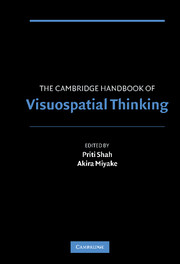Book contents
- The Cambridge Handbook of Visuospatial Thinking
- The Cambridge Handbook of Visuospatial Thinking
- Copyright page
- Contents
- List of Contributors
- Preface
- Acknowledgments
- 1 Functional Significance of Visuospatial Representations
- 2 Visuospatial Images
- 3 Disorders of Visuospatial WorkingMemory
- 4 Individual Differences in Spatial Abilities
- 5 Sex Differencesin Visuospatial Abilities
- 6 Development of Spatial Competence
- 7 Navigation
- 8 Mapping the Understanding of Understanding Maps
- 9 Spatial Situation Models
- 10 Design Applications of Visual Spatial Thinking
- 11 The Comprehension of Quantitative Information in Graphical Displays
- 12 Multimedia Learning: GuidingVisuospatial Thinking with Instructional Animation
- Author Index
- Subject Index
2 - Visuospatial Images
Published online by Cambridge University Press: 05 June 2012
- The Cambridge Handbook of Visuospatial Thinking
- The Cambridge Handbook of Visuospatial Thinking
- Copyright page
- Contents
- List of Contributors
- Preface
- Acknowledgments
- 1 Functional Significance of Visuospatial Representations
- 2 Visuospatial Images
- 3 Disorders of Visuospatial WorkingMemory
- 4 Individual Differences in Spatial Abilities
- 5 Sex Differencesin Visuospatial Abilities
- 6 Development of Spatial Competence
- 7 Navigation
- 8 Mapping the Understanding of Understanding Maps
- 9 Spatial Situation Models
- 10 Design Applications of Visual Spatial Thinking
- 11 The Comprehension of Quantitative Information in Graphical Displays
- 12 Multimedia Learning: GuidingVisuospatial Thinking with Instructional Animation
- Author Index
- Subject Index
Summary
We review evidence indicating that mental images, like pictures and percepts, depict rather than describe the represented content, and that visual images rely heavily on the same neural substrate as actual vision. Given this shared substrate, it is perhaps unsurprising that images also show certain sensory effects (e.g., sensory aftereffects) often associated with relatively low-level processes in vision. We argue, though, that images (like percepts and unlike pictures) are organized depictions, perceived within a perceptual reference frame that governs how certain aspects of the form are understood, and we consider some of the implications of this reference frame for image function. Evidence is also presented for a distinction between visual and spatial images, each with its own functional profile and its own neural substrate. Finally, we consider differences from one individual to the next in the vividness of mental images. We argue that, despite the skepticism of many investigators, vividness self-reports are interpretable and meaningfully linked to performance in at least some imagery tasks.
- Type
- Chapter
- Information
- The Cambridge Handbook of Visuospatial Thinking , pp. 35 - 80Publisher: Cambridge University PressPrint publication year: 2005
- 6
- Cited by

